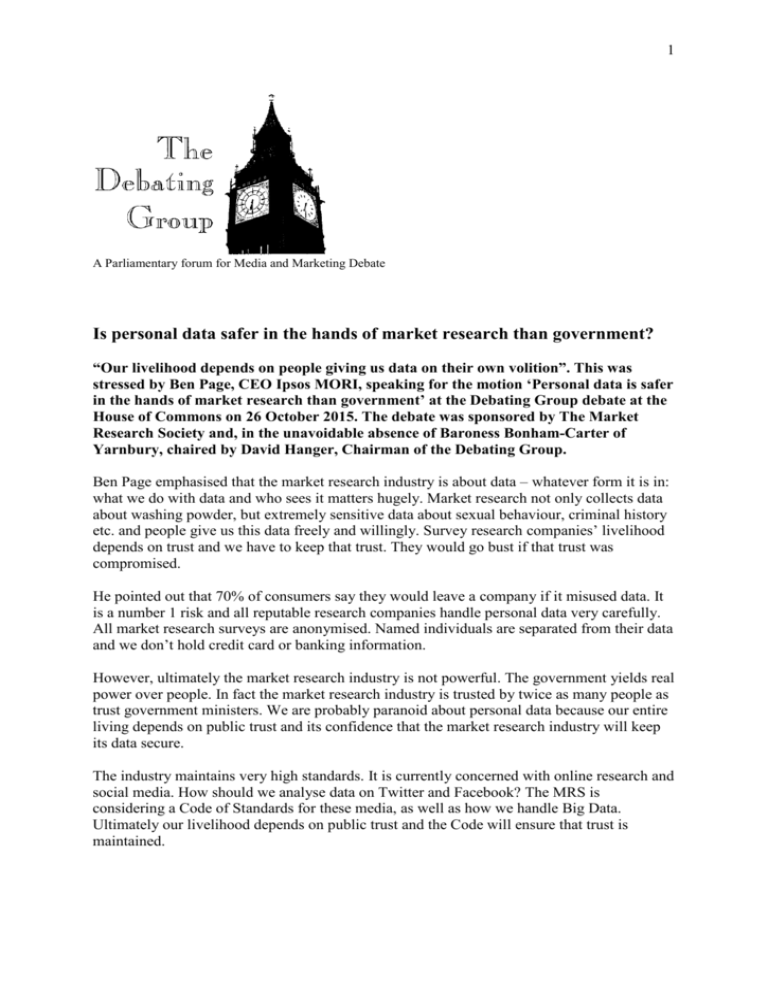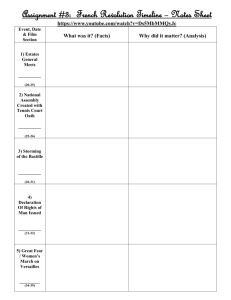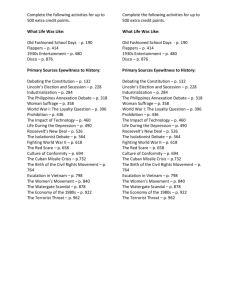Is personal data safer in the hands of market research than
advertisement

1 A Parliamentary forum for Media and Marketing Debate Is personal data safer in the hands of market research than government? “Our livelihood depends on people giving us data on their own volition”. This was stressed by Ben Page, CEO Ipsos MORI, speaking for the motion ‘Personal data is safer in the hands of market research than government’ at the Debating Group debate at the House of Commons on 26 October 2015. The debate was sponsored by The Market Research Society and, in the unavoidable absence of Baroness Bonham-Carter of Yarnbury, chaired by David Hanger, Chairman of the Debating Group. Ben Page emphasised that the market research industry is about data – whatever form it is in: what we do with data and who sees it matters hugely. Market research not only collects data about washing powder, but extremely sensitive data about sexual behaviour, criminal history etc. and people give us this data freely and willingly. Survey research companies’ livelihood depends on trust and we have to keep that trust. They would go bust if that trust was compromised. He pointed out that 70% of consumers say they would leave a company if it misused data. It is a number 1 risk and all reputable research companies handle personal data very carefully. All market research surveys are anonymised. Named individuals are separated from their data and we don’t hold credit card or banking information. However, ultimately the market research industry is not powerful. The government yields real power over people. In fact the market research industry is trusted by twice as many people as trust government ministers. We are probably paranoid about personal data because our entire living depends on public trust and its confidence that the market research industry will keep its data secure. The industry maintains very high standards. It is currently concerned with online research and social media. How should we analyse data on Twitter and Facebook? The MRS is considering a Code of Standards for these media, as well as how we handle Big Data. Ultimately our livelihood depends on public trust and the Code will ensure that trust is maintained. 2 ‘My data’ project Opposing the motion, Jo Swinson, Vice Chair of the Prime Minister’s Digital Task Force 2015 & Director of Clear Returns, made three main points: (1) no-one is good enough at security – neither commercial companies nor government (2) the market research industry faces specific risks (3) government is now a positive force in helping people with their data. Jo Swinson talked about the long line of data breaches, Talk Talk being the latest scandal. But there were other breaches e.g. Ashley Madison, Carphone Warehouse, even Mumset. She pointed out there were currently 173 law firms under scrutiny This is a live issue and a key threat and she did not think anyone was doing it as well as possible. Organisations and government are aware of their obligations. She acknowledged that there have been problems with government security, but the government is under intense scrutiny. People hold government to much higher standards than commercial companies, but there is no reason to think the market research industry is unique. No industry can have this halo. Market research is not immune from scrutiny and it is not free from specific risks e.g. it collects data on income, politics, sex, criminal records etc. as well as data on washing powders. Increasingly data is being collected by mobile technology, rather than desk top. More people respond to mobile surveys, but there is more risk. Government is trying to help people to unlock the potential of their own data. They give data away and can expect benefits in return. Hitherto power had been in the hands of organisations, but Jo Swinson suggested people should get benefit from giving their data. With the government’s ‘My data project’ the individual is in the driving seat. There are significant ethical issues and consumers should be at the heart of decisions about their data. Government is trying to help people understand and use their data. She concluded by suggesting that the market research industry is complacent about its role in the protection of data. Value exchange Seconding the motion, Stephan Shakespeare, CEO and Co-Founder YouGov, suggested that it is impossible to have complete data security. Nobody has got to the bottom of the problem of how to make data completely secure. There have been serious breaches from Government, e.g. data being shifted to NASA in America. Both the market research industry and government share worries about potential threats e.g. worries about privacy, hacking. And there are good reasons for being nervous, both for market research and even more for government. There are existential threats, as happened in Germany with Stasi. Bureaucracies are not always subject to the same risks. If a company makes an error there is redress; the CEO would almost certainly have to walk. This is huge risk for companies. This does not obviously apply to government. There is a tremendous value in data and everybody using it has a responsibility to make proper use of it. Although the last government was very keen on open data, bureaucracies are not happy to release data openly and freely. There is no transparency. 3 Stephan Shakespeare suggested there is a ‘value exchange’. People respond to market research surveys because they think it is useful to do so; they give data to the government because they have to. He believes it is incumbent on government to be bolder and share and make data available. If you give data to market research there is a different kind of value exchange. There are two big differences: market research has data which is freely shared and it is much riskier to give data to government. The government has more power than market research and it is therefore safer to give data to market research. Data scientists Seconding the opposition, Hetan Shah, Executive Director, The Royal Statistical Society, questioned how safe people feel in the era of digital data and Big Data. He suggested that they can probably trust market research companies but the new breed of data scientists do not necessarily have the same safeguards. People do not read terms and conditions and they are handing over enormous amounts of data without knowing where they are going. Where are the boundaries? Companies are accountable to shareholders, but there are risks when TV is watching you more than you are watching TV. How accountable are the algorithms used by data science companies? The Market Research Society has set up a Fair Data Unit, but this does not apply to data science companies. The government is not using your data against you. There are regulations in place and the data is being used for information about schools and hospitals to help people. Even if the government can be cackhanded it has the noblest of intentions. There is substantial evidence that people do trust the government. There was no public outcry at the Snowden affair. The government is not always as competent as it would like to be. It is certainly not competent at managing connected databases. Hetan Shah concluded that data is not safe: there is a new breed of data scientists who are hoovering data against you. Discussion from the floor For the motion: • • • • • • The contributor spoke of the work of the MRS regarding digital optimisation. It is reviewing the industry Code of Conduct to ensure that market researchers collect quality data and censure cases of quality discrepancies. In market research personal data is separated from survey data. The speaker stressed the importance of integrity in market research. The integrity of data is integral to what market researchers do. This is not always true of government and other businesses. In market research companies everybody cares about the data. In other organisations it is often the responsibility of someone else. Market researchers handle data and it is the only thing they do. The government does all sorts of things. Therefore market research is going to be better at it. In market research you have to have consent and this is one of the basic points of trust. You don’t have to give data if you don’t want to. People provide data to the government, not necessarily giving their consent and also without being aware of what their data is being used for. 4 • • • • • Ticking boxes is a way of collecting data, but this differs from the way market research is collected. In the past data has been safe with market research. However the contributor feared that in the future with Big Data, different skills might be needed. There are concerns about government data. We don’t know how our data is protected. The government should put effort in making its data transparent and protecting the consumer. The government holds more sensitive data than market research. The market research industry has very little data compared with government. Because of the orders of magnitude data is safer with market research, but it is not necessarily unsafe with government. Against the motion: • • • • • • • The contributor agreed with the polarity between market research and the public sector. Market researchers can work with anonymised data because their data is not used in an operational way. If you have operational data sets they are less safe. He wanted to see a debate that was not concerned with virtue but levels of safeguard. He believed they are easier on the market research side. Banks and retailers for example want to connect people with their views. People think data is safe just because they sign a consent form. Ticking a consent box, does not imply safety. Data research is always driven by the bottom-line The debate about market research versus the government is very compelling Market research does protect its data, but the government is doing an awful lot to protect data. The government has a UK Cyber Strategy. All government departments have cyber security built into their management structure. Cyber threats come from any place and any country. HMRC has a dedicated cyber security team to identify such threats. The contributor suggested that years ago we were pretty cavalier about data on paper which was often strewn around desks. In the old days we did not join up data. The point of Big Data is to join it up and cyber security is more of a problem. The consequences of breaches in security are not as great in market research as in government. The motion is asymmetrical. As citizens we expect the government to do a vast amount of things. It holds a lot of data which is required for use in many different ways. Inevitably market research is going to be safer. Therefore the motion is unfair. Uncertain: • • The contributor had a huge amount of sympathy with the people trying to defend market research. However he felt there was a degree of complacency within the industry. In the future there will be huge amounts of data and we will be looking at huge datasets. Inevitably we are going to find ourselves at greater risk. Integrity does not always apply in online space. There is a need to avoid complacency. Even though the government wishes to help the consumer, this does not mean that data is safe. We are governed by algorithms, which drive everything, but they may be better than a human decision. There is a lot of blurring of discussion about market research. There are so many problematic elements to data protection. 5 Summary Summarising for the opposition, Jo Swinson commented on the sense of complacency on the market research side. The onus was on market research to prove that it is better than government and industry generally in protecting data. But market research is not so different, particularly as industry is changing so much. If an industry thinks it’s OK it will not have systems in place. The links between market research and other parts of business are changing. Personal data needs to be attached because businesses need information about people. Big Data makes consent more difficult because you don’t know how it is going to be used. Solace in anonymised data is not enough. Data in transit might be vulnerable. There are different data types: not necessarily market research but operational data. Summarising for the motion Ben Page emphasised that we need to be clear about the difference between the market research profession and dodgy data scientists. The market research industry is keeping abreast of technological developments but it must not, of course, be complacent. Ipsos MORI holds government datasets as well as private datasets. It is not possible to personalise data in anonymised data. Ben page concluded “We will only stay in business if people have trust in us”. The result The motion was carried. Thanking the speakers and the Debating Group for holding the debate, Jane Frost, Chief Executive Officer of The Market Research Society referred to the MRS’ Delphi report ‘Private Lives? Privacy report’. She stressed that it is really important that the market research industry is not complacent. She sees the issue of data protection as an ethical rather than a regulation issue. Regulation does not always keep up with technology. The intent of The MRS’ Fair Data system is to provide consumers with a Trust Mark. Next debate The next debate will take place on Monday 25th January 2016 sponsored by the Institute of Promotional Marketing. For more details contact Doreen Blythe, Debating Group Secretary, e-mail: doreen.blythe22@btinternet.com







